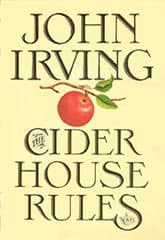The Cider House Rules
Critique • Quotes
 First edition
First editionFirst publication
1985
Literature form
Novel
Genres
Literary
Writing language
English
Author's country
Unitd States
Length
Approx. 265,000 words
Rules are made to be broken
In The Cider House Rules you can find nearly everything great about John Irving's writing, and probably much that his detractors think not so great. It could be his most characteristic novel—a return, after what some considered the misfire of The Hotel New Hampshire (1981), to the fine form of The World According to Garp (1978), with which it shares many features.
But it's a more settled, more mature approach to personal responsibility in changing times than that earlier, more youthful tour de force. Much as Garp startles and thrills and breaks your heart, The Cider House Rules may move you further on an ongoing basis.
The characters are still larger than life, their situations are still intense, they're still beset by a world of cruel ironies and crazy coincidences—but they're making it work. It's like the heady craziness of the 1960s is over and the serious revolutionaries are plugging away at quietly twisting the rules, changing society from within, one heart at a time, in the more grounded, introspective seventies. (I realize Garp and Cider House are published full decades after the times I've associated them with here, but that's the sense I get from them—or, admittedly, I could be reading into them.)
For many, The Cider House Rules is Irving's book about abortion. The hot-button issue receives the most sustained argument in the book—though presented less as a polemical treatise than as a personal journey.
A different life
Homer Wells is raised at St. Cloud's, an isolated orphanage in Maine where the founder, Dr. Wilbur Lynch, both delivers unwanted babies to be given to the orphanage and carries out early-term abortions if requested. The aging doctor loves the orphan Homer and trains him as his apprentice to eventually take over his obstetrical practice. But Homer has qualms: he agrees women should be able to choose abortions but thinks it's wrong to perform them himself.
Homer instead makes himself useful in an unusual relationship and a very different life far from the orphanage. Most of the novel takes place in this distant world—site of the titular cider house—but developments keep bringing the two worlds together and Homer has to resolve his ambivalence about the work at St. Cloud's.
Irving also keeps the two worlds, plus the progress of an ominous subplot, connected with some very subtle narrative, often moving back and forth among them within paragraphs, so smoothly you may not even notice the transitions.
As in every Irving novel, the characters in The Cider House Rules are colourful and memorable, each with distinctive quirks of speech and behaviour. This characterization and the novel's dramatic plotting with its secrets and revelations are of course right out of the work of Charles Dickens, to whom Irving is often compared. In fact, Irving is open about his model, having two of Dickens's novels, David Copperfield and Great Expectations, read to the parentless boys at St. Cloud's (along with Charlotte Brontë's Jane Eyre for the girls) and constantly referring to the Victorian novels, particularly in the mind of the orphan Homer.
But there is less a feeling in The Cider House Rules of the universe playing practical jokes upon humanity, smacking them when they least expect it. There is less a feeling of the author throwing bizarre twists at the characters to keep the plot boiling.
Not that the universe—or the author—doesn't play cruel tricks on the people. When you start listing them, you realize this novel is as full of Irving's favoured ironies, coincidences, and tragic turns as any of his works. But they seem to grow naturally out of character and circumstance—they seem less "made up" than is often apparent in Irving's work.
Or maybe I am more personally invested in his characters in this novel. I like them more. Even the mixed up and occasionally scary ones. I like how they muddle through to find ways of living together, as part of the human race, despite what is thrown at them. They don't all succeed, but they do enough to give hope.
The inevitable surprise
At several points, the author's intricate plotting and sub-plotting seem about to come together in an explosive climax. A regular Irving reader comes to watch for the casually presented elements suddenly merging in a high point that drastically changes lives. But in this story Irving plays with our expectations and the dreaded crises are resolved more humanely. Only, of course, to take their sad toll elsewhere, surprising us again and in a manner that in retrospect seems inevitable again.
The Cider House Rules provides material for the best movie adaptation of any Irving novel (screenplay for which the author himself won an Academy award), possibly because of this empathetic treatment of the characters. All politics is personal, Irving seems to be implying. It's fine to have rules but situational ethics—the needs of people to deal with the circumstances they find themselves in—sometimes trump the rules.
We hapless folks are all princes and kings.
— Eric
Critique • Quotes

